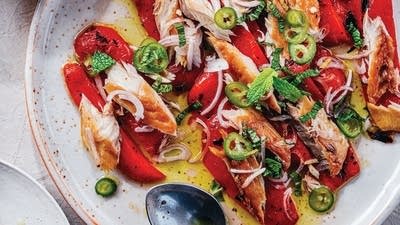
Robert Egger, founder and president of L.A. Kitchen, wants to create meals for seniors that are local, healthy and affordable.
Lynne Rossetto Kasper: From where you stand, what don't we understand about growing old in the U.S.?
Robert Egger: There's a theory that we plan for old age based on wishful thinking, that somehow we'll all be healthy, we'll be happy, we'll have enough money put aside. That's probably my greatest concern, is just that you're going to see a significant number of people who won't have enough money left for the extra years science is going to give them. The question becomes: How do we take care of those men and women who paid taxes, contributed to our society and are our elders?
LRK: What does L.A. Kitchen do? I gather that one of your goals is to take care of those people.
RE: It is. What I've launched in Los Angeles is more of a social business. We've arrived here saying -- metaphorically -- to the city: "You spend a significant amount of money on senior meal contracts, but you historically get processed meals made by people at a modest wage. Then profit leaves Los Angeles and never comes back. Let's try it a new way."
I'd like to apply for those contracts. I'll make an effort to buy food from local farmers, which can include urban farms. I'll train and then employ men and women home from prison and give them good-wage jobs. We'll prepare freshly made meals every single day. Money will never leave Los Angeles; it will be reinvested either in wages, the support of local farms, or back to support the job-training program, which starts the process all over again.
LRK: OK, but money is the hitch here. How much is allotted by the government for a senior meal?
RE: I'm glad you brought that up because federal reimbursement drives so much of food policy in America, whether it's school food, prison food or senior meals. But senior meals currently have one of the highest reimbursement rates of about $3.50 to $3.80. That includes the meal itself, the labor, and certain things like milk and condiments that go along with it.
As you can imagine, there's a pretty historic system of Meals on Wheels and senior service centers. But what we're looking at is the baby boomers coming. Not only will you have more people, but you're going to have a greater sense of expectation about nutritional content, much more of a great need and desire to be engaged beyond just playing dominoes and listening to Rudy Vallee records.
LRK: You said, at one point, that there's a lot of rigidity around senior meals. What do you mean by that?
RE: Any system, when you come along and say, "Let's try something new," you have to anticipate a certain amount of -- and frankly, sometimes a lot of -- resistance to change. Sometimes you have to fight the system. At one level, you're looking at a generation of nutritionists who were oftentimes trained 20, 30 years ago, as well as administrators that, for all intents and purposes, their machine is just chugging along. Here we're coming along saying, "Let's look at the whole thing, from soup to nuts: what seniors are fed; where they're fed; what they do before, during and after."
I'm just suggesting, and I think it's pretty clear, that the baby boomers are not going to be your grandfather's senior. They're going to want a whole different construct around aging. What we're trying to do here, and many other places, you just get out in front and start the experiments now.
LRK: What is that construct going to be?
RE: You're going to see a generation of much more nutritionally sophisticated seniors who are actually going to rebel against a processed meal, for lack of a better phrase. They're going to have their own culture of food, which is very much part of the American landscape now. But I think you'll see many more doctors actually talking much more openly, up to the point of prescribing better fruits and vegetables, more local foods, healthier meals.
From every corner, the pressure is going to be on the system to deliver a better product. The question is: How do you do it for reasonable money? That's the experiment we're deeply into. How do you feed more people a healthier meal for less money?
LRK: How do you feed more people for not a great deal of money?
RE: One of the breakthroughs we had in Washington, D.C., with the DC Central Kitchen, which I ran for many, many years and is now led by a great colleague, Mike Curtin, was going out to buy food from farmers. Instead of the charitable model of waiting for farmers to donate it, we started going out saying, "Can we talk about buying the stuff that you might not have a good market for because it's overripe, underripe, bent, broken or bruised?"
What we found is that we could access literally tons of locally sourced food -- all it took was a little flip of a knife to remove that bruise or blemish. That opened a huge door to a level of affordability for school food that we want to just transplant out here in Los Angeles, where you have just an insane growing season. We can access incredibly beautiful, healthy food year-round.
LRK: Are you still in a startup situation at this point?
RE: We are. We partnered with a great senior meal program here, St. Vincent Meals on Wheels, that opened their kitchen to us to come in and begin our job-training program. But our physical kitchen opened about nine months ago.
I always say I love my job, I hate my business -- because what we're looking at is thousands of Angelenos, and sadly tens of thousands, most likely, who are going to need some kind of nutritional support. We're prepared to do between 10,000 and 15,000 a day when we really get up and going.
LRK: What would be a typical meal?
RE: Yesterday we served salmon with buckwheat soba noodles, a soba noodle-coleslaw mix, and then glazed carrots. Again, what's nice is we're able to include a lot of the California products. What we're after constantly is: How can we source local, prepare freshly scratch meals and employ people, but get a meal in front of a senior that is really healthy that looks like somebody made it? I want people to look down and say, "Wow, that's restaurant-quality food. That's a beautiful dish." I want people to feel the love in it.
Before you go...
Each week, The Splendid Table brings you stories that expand your world view, inspire you to try something new, and show how food connects us all. We rely on your generous support. For as little as $5 a month, you can have a lasting impact on The Splendid Table. And, when you donate, you’ll join a community of like-minded individuals who love good food, good conversation, and kitchen companionship. Show your love for The Splendid Table with a gift today.
Thank you for your support.
Donate today for as little as $5.00 a month. Your gift only takes a few minutes and has a lasting impact on The Splendid Table and you'll be welcomed into The Splendid Table Co-op.




